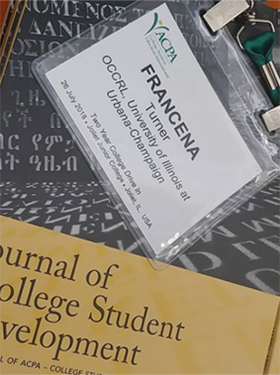Community colleges are near and dear to my heart and mind. I operate from the standpoint that they are necessary, integral, and worthy of full financial and community support as well as contextualized research focus. I was thrilled then to have had the opportunity to attend the fourth Two-Year College Drive-In Conference held by the American College Personnel Association (ACPA) at Joliet Junior College.
Co-sponsored by OCCRL, the conference theme was “Decolonizing Practice and Promoting Racial Justice in Community Colleges.” Eboni Zamani-Gallaher, the director of OCCRL, felt that ACPA and OCCRL could work together to merge ACPA’s Strategic Imperative for Racial Justice and Decolonization with its Commission for Two-Year Colleges’. This collaboration was further strengthened when Joliet Junior College (JJC)—the nation’s first public community college—agreed to host the event. When ACPA adopted the strategic imperative during their 2017 Convention, some members were uncomfortable with explicitly naming racial justice—and later decolonization—as integral to the organization’s work even as they welcomed ACPA’s explicit grounding in social justice. Recognizing this disconnect, Zamani-Gallaher said, “The prior two-year conferences were assessment focused, but I saw an opportunity to have these [explicit] conversations, previously four-year college-centered, but with a focus on community colleges.”
The keynote speaker, J. Luke Wood, set the tone of the conference with an honest and open student-centered look at some of the equity-driven research initiatives he’s spearheaded or been a part of to include the Community College Equity Assessment Lab (CCEAL) and the National Consortium on College Men of Color (NCCMC). He both spoke candidly to the current landscape of equity issues in community colleges and offered steps that faculty and staff should take to find and address equity issues on their own campuses. His focus on the introspective work faculty and staff needed to do prior to making decisions that affect students’ lives resonated with my own community college experience.
The 10 breakout sessions led by faculty, staff, and doctoral students from various institutions in Illinois and Utah focused on a variety of issues related to racial justice and education decolonization in the community college context. While it was difficult to choose sessions, I ultimately decided to attend “Using Intergroup Dialogue to Address Racialized Realities at Community Colleges,” and “Decolonizing Postsecondary Spaces: Using Pedagogy to Reimagine Education.” Chaddrick Gallaway, the leader of the “Using Intergroup Dialogue to Address Racialized Realities at Community Colleges” session, is a graduate research assistant at OCCRL and is a doctoral student in Education Policy, Organization, & Leadership at the University of Illinois, Urbana-Champaign, and earned his B.A. in Sociology from the University of Michigan, where “the first ‘formal’ Intergroup Dialogue” (IGD) program was founded in 1989 as a response to racial tensions that were happening on campus between students of color and white students” (Gurin, Nagda, & Zuniga, 2013). Considering that the vast majority of students of color pursuing higher education are doing so at community colleges while the community college faculty and staff are overwhelmingly white, Gallaway posited that a long-term commitment to facilitated dialogue on race and other intersecting issues would be beneficial towards creating an equity-driven faculty and staff and community college campus atmosphere. Session participants expressed concerns with the differences between desire to hold and participate in IGD and capacity to do so, possible lack of action post-dialogue, and the difficulty in changing entrenched campus cultures that privilege white students or feature deficit-minded views of students of color.
Kristal Raheem and Jason Keist, leaders of the “Decolonizing Postsecondary Spaces: Using Pedagogy to Reimagine Education” session, are graduate research assistants at OCCRL and they are doctoral students in Educational Policy, Organization, and Leadership at the University of Illinois. Their presentation focused on explicitly defining and discussing colonization and colonization within education. Citing Tuck and Yang (2012), Raheem and Keist challenged the overuse of the term “decolonization” and framed their session as part of a larger conversation around a turn toward honoring various indigenous ways of knowing and pedagogical tools. I was most taken by their juxtaposition of examples of Aboriginal, Afrocentric, and Culturally Relevant Pedagogies such that the similarities around student-centeredness, experience sharing, and trust were apparent.
As I gathered my things to leave the conference space, I remembered Gallaway’s “Why I Will Always Attend ACPA” and reflected on the day and my own community college experiences.
I belong to quite a few professional organizations, and rarely does an organization explicitly focus on community colleges, much less community colleges AND racial justice. I’m excited! The next ACPA Convention is in March of 2019, and I am inclined to agree with Gallaway. Boston, here I come!
